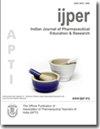印度阿萨姆邦Kailashpur农村人民传统上用于治疗割伤和伤口的药用植物的民族植物学研究
IF 0.8
4区 医学
Q3 EDUCATION, SCIENTIFIC DISCIPLINES
Indian Journal of Pharmaceutical Education and Research
Pub Date : 2023-08-23
DOI:10.5530/ijper.57.3s.77
引用次数: 0
摘要
摘要:背景:植物民间医学知识在初级卫生保健管理系统中至关重要,主要在农村和偏远地区。管理割伤和伤口仍然是一个重要的医疗保健问题,如果不及时治疗或治疗不当,它会变得更加严重。本研究的目的是对阿萨姆邦Kailashpur村治疗割伤和伤口的药用植物的使用进行调查。材料和方法:通过半结构化问卷从印度阿萨姆邦Kailashpur的30名被调查者中收集信息。对这些数据进行定量分析,找出使用价值(UV)、被引频次(FC)、相对被引频次(RFC)、家族使用价值(FUV)、共识指数(CI)、Rehman相似指数(RSI)和Jaccard指数(JI)。结果:本研究记录了30科45种药用植物及其应用模式。菊科(5种)、兰科(4种)和豆科(3种)是优势科。叶片是使用频率最高的植物部位(PPV为0.50)。当地居民最常使用的品种为姜黄(Curcuma longa)和凤尾花(Ocimum tenuuflorum) (UV = 0.33)。锥形Ageratum conyzoids的FC最高(5.27),其次是万寿菊(4.51)。JI和RSI表明,本研究报告的植物种类与印度阿萨姆邦的Tezpur地区更为相似。结论:该研究结果强调了特定植物物种在伤口治疗中的重要意义,并提示可以进一步进行科学研究以发现潜在的治疗方法。关键词:民族医学调查;凯拉什布尔村;药用植物;本文章由计算机程序翻译,如有差异,请以英文原文为准。
Ethnobotanical Study of Medicinal Plants Used Traditionally for Managing Cuts and Wounds by the Rural People of Kailashpur, Assam, India
Abstract: Background: Folk medicinal knowledge of plants is vital in primary health care management system, predominantly in rural and remote areas. Managing cuts and wounds continues to be a significant healthcare issue, and it becomes even more critical when left untreated or improperly treated. The objective of this study is to carry out a survey on the use of medicinal plants for treating cuts and wounds in the village of Kailashpur in Assam. Materials and Methods: The information was collected through a semi-structured questionnaire from 30 informants in Kailashpur, Assam, India. Quantitative analysis of these data to find Use Value (UV), Frequency of Citation (FC), Relative Frequency of Citation (RFC), Family Use Value (FUV), Consensus Index (CI), Rehman's Similarity Index (RSI) and Jaccard Index (JI) also completed. Results: The present study documented 45 medicinal plant species belonging to 30 families and their mode of application. Compositae (5 species), Orchidaceae (4 species) and Leguminosae (3 species) were dominant families. Leaves were the most frequently used plant part (PPV 0.50). Curcuma longa and Ocimum tenuiflorum (UV 0.33) were the species most commonly used by the local people. Highest FC was calculated for Ageratum conyzoids (5.27), followed by Tagetes erecta (4.51). JI and RSI indicated that plant species reported in our study were more similar to the Tezpur region of Assam, India. Conclusion: The findings emphasize the significance of specific plant species in the treatment of cuts and wounds, and suggest that further scientific investigation can be pursued to discover potential therapeutics. Keywords: Ethnomedicinal survey, Kailashpur village, Medicinal plants, Cuts, Wounds.
求助全文
通过发布文献求助,成功后即可免费获取论文全文。
去求助
来源期刊
CiteScore
1.40
自引率
0.00%
发文量
227
审稿时长
>12 weeks
期刊介绍:
The official journal of Association of Pharmaceutical Teachers of India (APTI) and is being published since 1967. IJPER, a quarterly publication devoted to publish reviews and research articles in pharmacy and the related disciplines of Pharmaceutical education. It mainly covers the articles of special interest, covering the areas of Pharmaceutical research, teaching and learning, laboratory innovations, education technology, curriculum design, examination reforms, training and other related issues. It encourages debates and discussions on the issues of vital importance to Pharmaceutical education and research. The goal of the journal is to provide the quality publications and publish most important research and review articles in the field of drug development and pharmaceutical education. It is circulated and referred by more than 6000 teachers, 40,000 students and over 1000 professionals working in Pharmaceutical industries, Regulatory departments, hospitals etc.

 求助内容:
求助内容: 应助结果提醒方式:
应助结果提醒方式:


